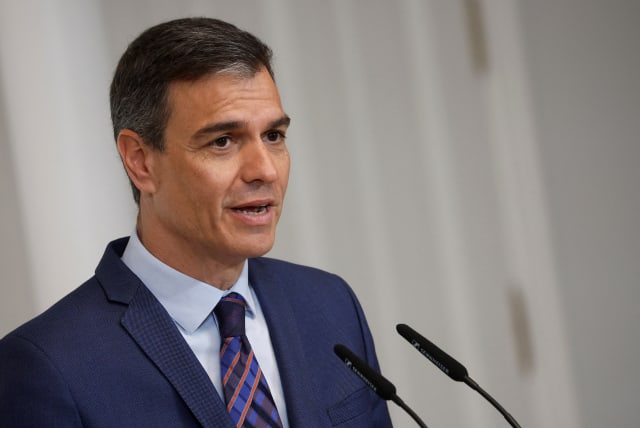Spanish PM against Israeli judicial reform after trying similar legislation

Spain's PM tried to pass similar legislation to the judicial reform in December but was blocked by the Spanish Constitutional Court.
Spanish Prime Minister Pedro Sanchez was criticized for his support of Israeli protestors against the judicial reform as he tried to pass similar reforms to the Spanish Constitutional Court at the end of last year.
Sanchez released a video on Saturday night voicing support for the anti-judicial reform protests. The video was made at the request of Tomer Reznik, secretary-general of Meretz, as reported by Walla.
“Dear Israeli friends, we as Socialist International have always fought for freedom, equality, justice and democracy,” said Sanchez in the video. “Yet, as many of you already know, these are values that we cannot take for granted, and that we have to promote and defend on a daily basis. As such, now as always, the Socialist International stands in solidarity with the people of Israel. Dear friends, you will always find us in the fight for democracy.”
Israel's foreign minister Eli Cohen criticized the Spanish prime minister saying, "No foreign entity will decide for the public in Israel and I am sure that Sanchez has no such intention."
Meretz and Sanchez's party, the Spanish Socialist Worker's Party, both belong to the same political international group - the Socialist International. Socialist internationals serve as transnational organizations for parties that have similar ideologies and values.
Sanchez's support was criticized, however, as he tried to pass similar reforms to the Judicial Selection Committee bill in December. At the time, the Spanish Constitutional Court suspended the legislation after a challenge by the main opposition party, the People's Party.
Similar legislation in different contexts
The legislation's key proposal was to change the way the Constitutional Court judges were selected.
Currently, the Court is composed of 12 judges who are appointed by the king for nine-year terms, with a third being rotated every three years. Eight of the judges are to be selected by the Cortes Generales, four from the lower house and four from the upper house. Each house must select its own candidates with at least a three-fifths majority of all members of the house. Another two are appointed directly by the government and the final two by the General Council of the Judiciary.
But the Court has been facing a political deadlock since 2018 when a third of the mandates expired. This is a total of four mandates, three conservative and one progressive, but the Spanish government has been unable to appoint new judges due to fighting in the government.
Sanchez tried to push the legislation to change the way judges are chosen supposedly in an attempt to solve the deadlock and be able to appoint new judges, but the Spanish Constitutional Court blocked the legislation.
At the time, The Guardian reported that Sanchez called the suspension unprecedented in the 44 years since the death of former dictator General Franco, although he said he would abide by the ruling.
According to The Guardian, Junior coalition party leader, Ione Belarra of Podemos, also called it "an unprecedented coup against democracy".
The leader of the rival People's Party, Alberto Núñez Feijóo claimed they were just defending the constitutional order against a "hasty and cynical plan," as reported by the Guardian.
Jerusalem Post Store
`; document.getElementById("linkPremium").innerHTML = cont; var divWithLink = document.getElementById("premium-link"); if (divWithLink !== null && divWithLink !== 'undefined') { divWithLink.style.border = "solid 1px #cb0f3e"; divWithLink.style.textAlign = "center"; divWithLink.style.marginBottom = "15px"; divWithLink.style.marginTop = "15px"; divWithLink.style.width = "100%"; divWithLink.style.backgroundColor = "#122952"; divWithLink.style.color = "#ffffff"; divWithLink.style.lineHeight = "1.5"; } } (function (v, i) { });

